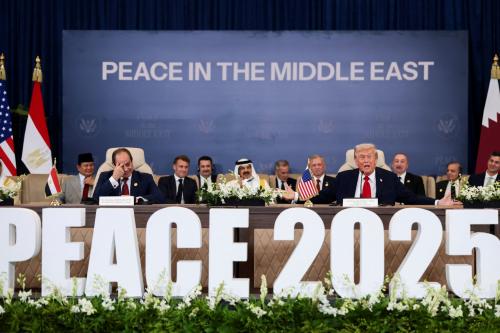This blog is a summary of an evidence review conducted for the U.S. Institute of Peace. The full report is available here.
Peacebuilding encompasses a wide variety of activities aimed at halting or preventing violent conflict within or between states and helping societies to heal after conflict does occur. These activities can include—but are certainly not limited to—diplomacy, fostering conditions for fair democratic elections, building up institutions such as courts that support long-term societal stability, creating opportunities for meaningful cooperation between groups, and reintegrating people who have been displaced by ethnic violence. The breadth and scale of these activities make it an incredibly difficult problem to approach. In a recent review of the literature, we identified a set of tools from systems science that could provide a path forward.
Peacebuilding is hard, with many complex forces at work. Disengaging parties from active conflict, proactively keeping it from igniting in the first place, or rebuilding cohesion after conflict all push against powerful psychological headwinds: distrust, resentment, and hatred. This work is often impeded by entrenched interests that benefit from discord, and the window for effective action can be very limited.
But the challenges of peacebuilding efforts pale in comparison to those faced by nations where peacebuilding has failed. As we have seen in the ongoing Russian invasion of Ukraine, the potential costs of conflict can be staggeringly large. These are experienced within the nations directly involved in terms of lives lost, injury, illness, destruction, social upheaval, and economic disruption. They are also felt broadly elsewhere, especially in an increasingly intertwined global community: influxes of refugees, sudden loss of resources needed to feed and warm people, and a dramatic interruption in normal economic activity.
Systems science approaches can make practical contributions that help peacebuilding practitioners and decisionmakers address violent conflict
Often peacebuilding efforts are hindered by reliance on methods that implicitly or explicitly focus on isolating and separately quantifying the contribution of individual factors. Conflict—and, its positive opposite, sustainable peace—is driven by multiple, overlapping factors that often operate on large time scales (e.g., decades or even generations) and across very disparate settings around the world. Many working in peacebuilding have advocated for taking a systems perspective that acknowledges and explicitly grapples with this complexity to uncover key drivers of conflict and craft policies and practices that can effectively and sustainably address them. An important first step is determining whether and how specific analytical methods from systems science can productively contribute to real-world program design, evaluation, and peacebuilding in the field.
We reviewed recent research to answer this question. Our study shows how systems science approaches can make practical contributions that help peacebuilding practitioners and decisionmakers address violent conflict (and its aftermath) more effectively.
To date, direct application of systems science tools to peacebuilding has been limited. These efforts have tended to address surface-level research topics with modest implications for designing and implementing high-impact peacebuilding efforts. When we consider the success of systems science in related fields, we see a wealth of untapped potential in using systems science tools to provide concrete guidance to peacebuilding efforts. For example, we and other researchers have used these approaches to understand why observed levels of health disparities occur, which effect pathways or leverage points might matter most, why past or existing policies and interventions have observed effects in a given context, and how novel proposed policies or interventions might affect different communities (including heterogeneous effects and unintended negative consequences).
We identify reasons to be quite optimistic that the application of systems science methodologies might similarly help reveal key leverage points to reduce conflict and create effective strategies to promote sustainable peace. We argue peacebuilding can benefit from a powerful new set of tools to address questions about what works, for whom, and why.
The Brookings Institution is financed through the support of a diverse array of foundations, corporations, governments, individuals, as well as an endowment. A list of donors can be found in our annual reports published online here. The findings, interpretations, and conclusions in this report are solely those of its author(s) and are not influenced by any donation.
-
Acknowledgements and disclosures
Chris Miller provided editorial assistance for this blog.
The Brookings Institution is committed to quality, independence, and impact.
We are supported by a diverse array of funders. In line with our values and policies, each Brookings publication represents the sole views of its author(s).




![Photo showing "I [heart] Syria" sign along the road in Syria](https://www.brookings.edu/wp-content/uploads/2025/11/I-heart-syria-photo.jpg?quality=75&w=500)


Commentary
Using new tools to help US peacebuilding efforts succeed around the world
April 5, 2023